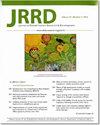Multivariate assessment of subjective and objective measures of social and family satisfaction in Veterans with history of traumatic brain injury.
Q Medicine
Journal of Rehabilitation Research and Development
Pub Date : 2016-01-01
DOI:10.1682/JRRD.2014.11.0295
引用次数: 6
Abstract
Approximately 20% of current-era Veterans have sustained a traumatic brain injury (TBI), which can result in persistent postconcussive symptoms. These symptoms may disrupt family and social functioning. We explored psychiatric, postconcussive, and cognitive factors as correlates of objective functioning and subjective satisfaction in family and social relationships. At entry into a supported employment study, 50 unemployed Veterans with a history of mild to moderate TBI and current cognitive impairment were administered baseline assessments. Multivariate stepwise regressions determined that higher levels of depressive symptomatology were strongly associated with less frequent social contact, as well as lower subjective satisfaction with family and social relationships. Worse verbal fluency predicted less frequent social contact, whereas worse processing speed and switching predicted higher levels of subjective satisfaction with family relationships. The pattern of results remained similar when examining those Veterans with only mild TBI. Depressive symptoms and cognitive functioning may impact Veterans' social contact and satisfaction with family and social relationships. Evidence-based interventions addressing depression and cognition may therefore aid in improving community reintegration and satisfaction with social and family relationships.创伤性脑损伤退伍军人社会和家庭满意度主客观指标的多变量评价。
大约20%的现役退伍军人遭受过创伤性脑损伤(TBI),这可能导致持续的脑震荡后症状。这些症状可能会破坏家庭和社会功能。我们探讨了精神、脑震荡后和认知因素对家庭和社会关系中客观功能和主观满意度的影响。在一项支持性就业研究开始时,50名有轻度至中度TBI病史和当前认知障碍的失业退伍军人接受了基线评估。多变量逐步回归表明,较高程度的抑郁症状与较少的社会接触以及较低的对家庭和社会关系的主观满意度密切相关。较差的语言流畅性预示着较少的社会接触,而较差的处理速度和转换预示着对家庭关系较高的主观满意度。当检查那些只有轻度创伤性脑损伤的退伍军人时,结果的模式仍然相似。抑郁症状和认知功能可能影响退伍军人的社会接触和对家庭和社会关系的满意度。因此,针对抑郁症和认知的循证干预措施可能有助于改善社区重返社会和对社会和家庭关系的满意度。
本文章由计算机程序翻译,如有差异,请以英文原文为准。
求助全文
约1分钟内获得全文
求助全文

 求助内容:
求助内容: 应助结果提醒方式:
应助结果提醒方式:


